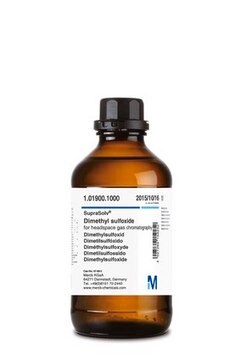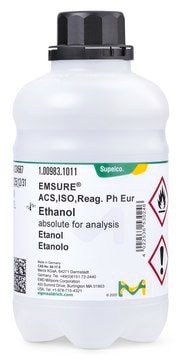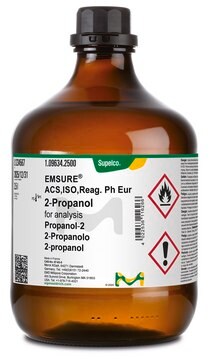78769
1-Methyl-2-pyrrolidinone
analytical standard
Synonym(s):
1-Methyl-2-pyrrolidone, N-Methyl-2-pyrrolidone, NMP
About This Item
Recommended Products
grade
analytical standard
Quality Level
vapor density
3.4 (vs air)
vapor pressure
0.29 mmHg ( 20 °C)
0.99 mmHg ( 40 °C)
Assay
≥99.9% (GC)
autoignition temp.
518 °F
shelf life
limited shelf life, expiry date on the label
expl. lim.
9.5 %
technique(s)
HPLC: suitable
gas chromatography (GC): suitable
refractive index
n20/D 1.47 (lit.)
n20/D 1.470
bp
202 °C (lit.)
81-82 °C/10 mmHg (lit.)
mp
−24 °C (lit.)
density
1.028 g/mL at 25 °C (lit.)
application(s)
cleaning products
cosmetics
environmental
food and beverages
personal care
format
neat
SMILES string
CN1CCCC1=O
InChI
1S/C5H9NO/c1-6-4-2-3-5(6)7/h2-4H2,1H3
InChI key
SECXISVLQFMRJM-UHFFFAOYSA-N
Looking for similar products? Visit Product Comparison Guide
General description
Application
Signal Word
Danger
Hazard Statements
Precautionary Statements
Hazard Classifications
Eye Irrit. 2 - Repr. 1B - Skin Irrit. 2 - STOT SE 3
Target Organs
Respiratory system
Storage Class Code
6.1C - Combustible, acute toxic Cat.3 / toxic compounds or compounds which causing chronic effects
WGK
WGK 1
Flash Point(F)
195.8 °F - Pensky-Martens closed cup
Flash Point(C)
91 °C - Pensky-Martens closed cup
Personal Protective Equipment
Choose from one of the most recent versions:
Already Own This Product?
Find documentation for the products that you have recently purchased in the Document Library.
Articles
The Utility of Headspace Grade Solvents for the Analysis of Organic Volatile Impurities
Our team of scientists has experience in all areas of research including Life Science, Material Science, Chemical Synthesis, Chromatography, Analytical and many others.
Contact Technical Service






